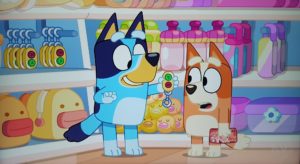There are probably a hundred things I love about the sisterly relationship between Bluey and Bingo. The show does such an incredible job at honoring their different personalities as well as their different stages of development (since they’re supposed to be 4 and 6 years old).
The one I’m thinking about today, though, is the differences in speech between the two of them. You could also call it their “verbal fluency” or “processing speed” or any one of a number of other speech skills.
I don’t think Bingo is actually supposed to be depicted as having any kind of speech delay. I think she’s just spot-on for a slightly shyer and quieter 4yo. But compared to Bluey, her 6yo sister who’s highly verbal, confident, and assertive, sometimes her voice has a harder time being heard. There are numerous episodes dealing with this theme!
As the parent of a child who does have actual speech delays, I love it. I love it for showing kids who are more like Bluey that their friend or sibling or classmate does have things to say if you give them a bit of time to find their words. I love it for showing kids who are more like Bingo that their voice is valuable and deserves to be heard by the people who love them. I love it for showing teachers and parents that they need to slow down sometimes and not expect a child to have the processing speed or verbal recall of an adult.
In the very first episode, Magic Xylophone (s1 e1), Bingo keeps trying to have a turn playing the game they’re playing and Bluey doesn’t want her to. (Bluey has a decent point here, too: Bingo is slower at running away from Dad, who’s chasing them, and Bluey worries that if she gives Bingo a turn, the game will be lost. A good opportunity for Dad to try to hear their concerns and mitigate the situation as much as he can!) In the end, Bingo has to “freeze” Bluey to get a chance to say everything she wants to say — she just needs a little more time to put her thoughts into words.

In Dance Mode (s2 e1), Bingo’s family keep prompting her to say “yes” to things when she really doesn’t want to. By the end of the episode, her mom has realized how much they’re trampling on her opinion and her ability to consent. She has said “yes” out loud (because of people begging her to do so), so they didn’t realize that what she really wanted was to say “no”. Plus, it models the use of a communication tool — she gets a “yes/no” button and has an easier time pushing the button to say what she really wants rather than being able to say it out loud!
In Hairdressers (s2 e5), this theme is echoed again and even more blatantly — Mum tells Bluey that Bingo is having a hard time finding her words. I love this for a number of reasons: first of all, it’s incredibly normal for children to go through a period of stammering/stuttering around the age of 3 or 4, because their brain starts to be able to think way faster and of much bigger ideas than they can put into words! Secondly, because Bluey thinks that she’s helping her sister by blurting out her own ideas (aka, speaking for her). This is something that MANY many parents and teachers think is helpful for their children who struggle with speaking, and we’re adults who should know better! But instead Mum points out that what is helpful is to actually put on her listening ears and give Bingo the time and space to figure out what it is she wants to say.
There are other episodes that echo this theme too, and I love that it wasn’t treated as a “one and done” learning opportunity but actually as an ongoing personality and developmental trait of Bingo and Bluey and who they are. Kids who struggle with speech aren’t going to suddenly and magically become fluent speakers just because they were listened to once, and everyone’s problems don’t get solved in the span of seven minutes. 😉
Instead, compassionately taking the time to slow down and hear what someone is saying — and give them tools to express themselves if they need — is an ongoing expectation that we adults all should learn how to meet.



